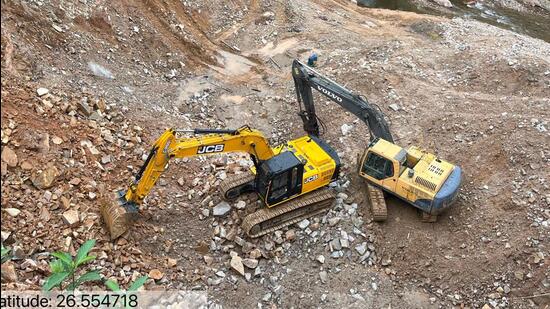ByJayashree Nandi, New Delhi
Jul 18, 2024 01:04 AM IST
There is widespread sand mining and stone quarrying with heavy machinery in the Deithor and Rangsali rivers in Assam, said the complaint.
There is widespread sand mining and stone quarrying with heavy machinery in the Deithor and Rangsali rivers in Assam, in violation of Supreme Court’s orders, a complaint sent to the Supreme Court’s Central Empowered Committee has flagged.

These rivers play a vital role in maintaining the ecosystem of the region adjoining the rivers: Kaziranga National Park and Tiger Reserve and Kaziranga – Karbi Anglong Elephant Reserve.
ALSO READ- Assam floods: 200 animals including 10 rhinos killed in Kaziranga National Park
The Supreme Court while hearing the TN Godavarman Vs Union of India and others on April 12, 2019 in a related matter on sand mining in Karbi Anglong ordered: “We order that all kind of mining and related activities along the aforesaid Kaziranga National Park area and in the entire catchment area of rivers/streams and rivulets originating in Karbi Anglong Hill ranges and flowing into Kaziranga National Park, including the tiger reserve are restrained. No new construction shall be permitted on private lands which form part of the nine identified animal corridors.”
ALSO READ- Climate-proofing cities: Will Mumbai pilot offer lessons?
But in a letter to CEC, environmentalist, Mukrang Engleng wrote on July 3: “The impact of sand mining through machinery in the Deithor and Rangsali rivers has led to habitat destruction, erosion of river banks, alteration of river flow patterns, and disruption of aquatic ecosystems. It has also resulted in loss of biodiversity, the fish populations have also declined drastically, and degradation of water quality has also increased drastically posing health risk to both human and animal lives. Furthermore, sand mining has exacerbated flooding, as it alters the natural sediment balance of the river. Socially and economically, it has affected communities that rely on rivers for livelihoods, such as fishing and agriculture”.
HT reported on July 12 that nearly 200 wild animals including 10 rhinos have been killed in Kaziranga National Park and Tiger Reserve (KNPTR) in Assam due to the ongoing floods, which has affected the state since May.Spread across 1,300 square kilometres, KNPTR, which houses over 2600 one-horned rhinos, is the largest habitat of the endangered species.
ALSO READ- New climate finance goal top priority for Baku deal: COP29 letter to member nations
Central Empowered Committee (CEC) was formed by order dated 9th May, 2002 passed by Supreme Court of India in TN Godavarman Thirumalpad Vs Union of India and Ors. It was constituted at the national level, for monitoring of implementation of Supreme Court’s orders and to place the non-compliance cases before it.
“These rivers and rivulets are used by indigenous people. They are sacred to us and we want access to our clean rivers. That is why I have decided to highlight the problem. Everyone in this region is very scared to speak up against mining,” said Mukrang Engleng, engineer by profession and environmentalist.


